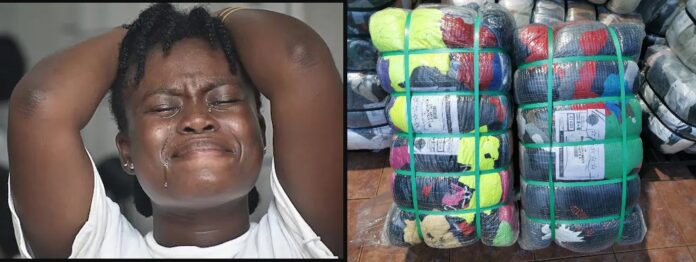Agatha Nkirote is a Kenyan content creator and entrepreneur. In a video uploaded on her YouTube Channel with over 50,000 subscribers, Nkirote narrates how she lost all her money in a mitumba business she had started with a friend.
Nkirote was an employee in a well-paying Chinese company but was never excited about her job. She decided to quit to try her hand at entrepreneurship alongside a friend with whom they partnered to put up a second-hand baby cloth shop at the busy Toi Market.
“I knew with baby clothes in Mitumba business, kids are always going to get born, and the market would not get exhausted,” explained Nkirote.
Where to buy affordable second-hand clothes for a Mitumba business in Nairobi
All was well until they secured the first bale from an Indian vendor along Mombasa Road. The bale, which was worth Ksh 13,000, was full of rejects.
“When I opened the bale, I almost cried. Almost the whole bale comprised of rejects. I was so disappointed. If you don’t have someone to guide you on the best bales to buy, you will face it rough,” she said.
She managed to sell the good clothes and made Ksh 4,000 thanks to her friend, who linked her to a different supplier for her next stock.
“I got another bale, and it was looking promising. The next weekend I sold Ksh 5,400, and I was so happy, and I couldn’t lack Ksh 1,000 or Ksh 500 within the week from passers-by,” she added.
Her dream was to get to the levels of her colleagues who would make over Ksh. 20,000 a day, but things took a different turn when the COVID-19 pandemic hit.
Grace Wambere: How I made it in mitumba business after quitting IT job
A viral video claiming that secondhand clothes from abroad contained the virus surfaced, prompting people to refrain from buying mitumba clothes, especially baby clothes, given how sensitive babies are to diseases.
“Who would buy clothes for their kids to get infected? There were no customers at all. I remember we could open shops and sit outside waiting for a single client to pass by, but nobody was passing,” she added.
Double trouble hit her way when the government introduced social distancing in public service vehicles which hiked the fare. She would spend around Ksh 500-600 a day, yet there were no customers.
It became difficult for her to commute to the shop daily, and she decided she would only sell on the weekends.
“Within a month, I was broke to the point that I couldn’t even get fare to go to the shop. I would go to the shop on Thursday, Friday, and Saturday, but still, no people were coming,” she explained.
Her stock remained in the shop unsold, with another bale stuck in the port of Mombasa for three months. At this point, she had no choice but to shut down her shop. Nkirote blamed the lack of research on the fall of her business.
“There is nothing bad like going into business with this fantasy that people are making money, and you have not done your research well, you will fail,” warned Nkirote.








